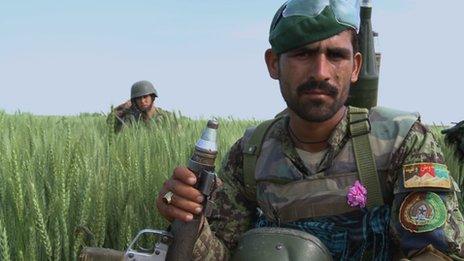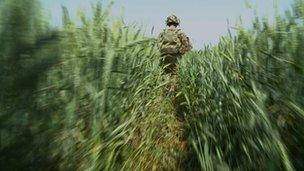Nato grapples with rogue elements in Afghan ranks
- Published

Afghan soldiers say the feeling of mistrust is mutual
Through thick mud in Helmand province, a joint Afghan and British patrol snakes its way through fields deep in opium poppies and wheat.
They march in single file in the hope of reducing the chances of triggering a Taliban roadside bomb.
But the Taliban are not the only threat to British soldiers.
In this year alone, 18 foreign soldiers have been killed by the Afghans they serve alongside.
A dramatic jump in so called green-on-blue killings, amounting to an average of one a week this year, has led to a serious erosion of trust. Only Taliban bombs have killed more international soldiers.
Maj Bev Allen of the Royal Anglian Regiment, who is leading the British advisers on this patrol, acknowledges that "there are moments when we are vulnerable".
"We live out in austere locations, we have procedures. We remain vigilant at all times, and we try to keep that risk to a minimum," he said.
"But it's one of the most important elements of the job we do here. We demonstrate to the Afghans that we trust them, and that we are in the fight and we share the danger with them."
Convivial atmosphere
The soldiers on the patrol say they never fully let their guard down.

Both sides operate in areas where possible Taliban attacks are an ever-present danger
Only last month, Sgt Luke Taylor and L/Cpl Michael Foley were murdered by an Afghan army sergeant.
The Afghan military has apologised but offers little reassurance that it will not happen again.
"We do our best, our intelligence departments try to prevent [the] entering of enemies into the Afghan National Army [ANA] but [we] cannot promise that it will not happen again... I can't say anything about it, it is out of my control," Brig Gen Sherin Shah of the ANA said.
The soldiers stop for tea. It is a rare moment to relax and the atmosphere is convivial.
But troops are now taking more precautions. At all times, someone will remain armed - a guardian angel - to protect against rogue Afghans.
And according to a senior Nato-official, further precautions are being taken.
ANA soldiers returning from leave in insurgent-affected areas will be screened to see if they have been intimidated.
Phones have been withdrawn from Afghan soldiers on operations.
'Trustworthy'
Also, Taliban ring tones have been banned, even when the Afghan security forces use them as a joke.
Sgt Simon Mercer works closely with Afghan artillery soldiers and sees little difference in them compared to British soldiers.
"You have to be aware about what you're saying, there are cultural taboos that you don't want to cross, talking about women, things like that," he said.
"But it's all to be taken with a bit of salt - once you build up a relationship with them, they are just as trustworthy as the soldiers that I work with, day-to-day, in the UK."
Pte Christopher Jackson took a different view when I asked him if he 100% trusted Afghan soldiers.
"I'd say 70%, you've always got to be wary, because there are some that are not who they say they are, but in general most of them are a decent bunch of lads," he replied.
The Afghan military did not want us speaking to their soldiers, but in a brief exchange one explained that feelings of distrust are mutual.
"I trust them, as much as they trust me," he said.
The <link> <caption>recent burning of the Koran by American soldiers</caption> <altText>US Afghan Koran burning row</altText> <url href="http://www.bbc.co.uk/news/world-asia-17110079" platform="highweb"/> <url href="http://www.bbc.co.uk/news/world-asia-17110079" platform="enhancedmobile"/> </link> - they claim inadvertently - exposed the gulf between foreigners and Afghans.
As a result more foreign soldiers were killed by their Afghan partners. The Taliban said they were responsible - and that they had soldiers hidden in army ranks waiting to strike.
Nato commanders at bases here in the south of Afghanistan, however, insist that the Taliban have not infiltrated the Afghan security forces.
But that is open to question. What we do know is that some of those who killed Nato soldiers were at least Taliban sympathisers and that as the Afghan Army and police grow, the number of these attacks will correspondingly increase.
The operation ends as darkness falls with an address from Maj Allen. His message is work hard on making this relationship work, because Afghans taking the lead means that British troops can go home.
Even though it is eroded, the partnership has never been more important, because these Afghan soldiers are Britain's exit strategy.
- Published16 March 2012
- Published20 January 2012
- Published6 August 2011